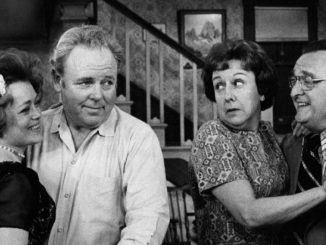Greetings pop pickers and welcome to this week’s Fabulously Flamboyant Friday, our weekly tribute to the rainbow and glitter world of music produced by artistes who are simply fabulous darling. This week we’ll be examining the labours of Hercules, poking around with Pinner’s finest and delving back into the damp, dark and worryingly beige world of the early ’70s – not ‘arf!
And so, without further ado, let’s get this Friday’s lavishly bespectacled and ludicrously be-syruped entertainment underway with Captain Fantastic himself – Ladies and Gentlebodies, the one, the only, Sir Elton Hercules John!
We should probably get a few ground rules out of the way. FFF will not be considering Mr John’s entire career, nor will we focus on the increasingly flamboyant pantomime dame routine (once with Johnny Gielgud, no less) of recent years. No, this Friday’s missive will focus on peak Reg. The five short but incredibly fruitful years that ran from April 1970 to May 1975, when the songwriting partnership of Reg and Bernie churned out an astonishing run of superb hit singles and multi-platinum selling albums. A period of such chart-rodgering dominance that even superstars such as Led Zeppelin and The Rolling Stones were forced to stare in wonder at Elton’s chart performance and mutter disconsolately, God damn!
Reginald Kenneth Dwight was born in Pinner in 1947 and was soon bashing away at his instrument. His Joanna bothering clearly paid off as, aged just 11, he landed a junior scholarship to the Royal Academy of Music, where apparently he did rather well. By the age of 15 he was playing piano in local pubs and soon dropped out of school, determined to pursue a full-time career in music. In ’67 Reg met Bernie – the poet and lyricist, Bernie Taupin. They quickly realised their writing styles matched well and began collaborating. Reg soon changed his name to Elton Hercules John and the rest, as they say, is history.
Elton’s career took off (on both sides of the Atlantic) in 1970, with his eponymous second album and his first major hit single, “Your Song”. His rise from this point on was truly spectacular. During 1971 alone he had four albums in the US Billboard chart: Tumbleweed Connection, Friends, 11-17-70 and Madman Across the Water.
During the three year period from 1972 to 1975, Elton John and Bernie Taupin would write and release a seemingly endless run of hit singles and seven top-notch albums, all certified platinum, that would top the US charts for a combined total of 39 weeks. This really was Peak Reg – a truly astonishing performance. For a three-year period during the mid-1970s, 1 in every 4 weeks had an Elton John album at number 1 in the US, and 1 in every 4 weeks had an Elton John single in the top 40 – and his success in Europe was not very far behind this staggering US performance.
And during this period Elton was also busy with a substantial list of other ventures. He started his own record label, The Rocket Record Company, and managed to sign up a few notable acts, including Kiki Dee and Neil Sedaka. His collaboration with Kiki Dee gave Elton his very first UK no.1 hit single (“Don’t Go Breaking My Heart”, video at the head of this article).
In 1974 Elton also collaborated with John Lennon on a cover of the Beatles’ “Lucy in the Sky with Diamonds”. In return, Elton featured on “Whatever Gets You Thru the Night”, which subsequently appeared on Lennon’s Walls and Bridges album. Also in ’74, one of John Lennon’s final major live performances took place with Elton John at Madison Square Garden in New York. Luckily, a pretty decent audio recording of this historic Elton / Lennon performance still exists. The accompanying film footage however, although beautifully faked, is taken from a later Lennon biopic.
In ’75 Elton was named as “the outstanding rock personality of the year” at the first annual Rock Music Awards in Santa Monica, California. Also in ’75, Pete Townshend invited Elton to perform in the film adaptation of his rock opera, Tommy (directed by the ludicrously over-the-top and, IMHO, seriously overrated Ken Russell). Elton flamboyantly contributed his cover of “Pinball Wizard” to the film and its accompanying soundtrack album.
Importantly, however, 1975 also saw the successful release of Elton’s ninth studio album, the semi-autobiographical Captain Fantastic and the Brown Dirt Cowboy. Taupin’s lyrics on this album describe the duo’s early days as struggling musicians and songwriters in London’s Tin Pan Alley. For me, this is a key release. It’s the album on which the duo paused to take stock, to look back and consider how far they had come, and to consider how much had changed for them both. It is this album (in the opinion of your humble scribe) that signals the end of Peak Reg and the massive mid-70s chart domination of Elton John.
Over the next 18 months or so, Elton would break up the band that had been the mainstay of his live shows, would start complaining publicly about overwork and exhaustion, would announce his retirement from live performance and, crucially, he would start to drift away from working with Bernie Taupin.
Happily, every single one of these decisions would eventually be reversed, but Elton’s career, although still hugely successful and impressively enduring, would never again reach the heights of his mid-70’s chart domination on both sides of the Atlantic. Elton would go on to be fabulously flamboyant and hugely popular for many decades, but Peak Reg was over and it would never return.
As a Puffin fond of Wendyball, I can’t let this article conclude without mentioning Elton’s time as the chairman and director of Watford Feetball Club. In 1976 Elton invested substantial monies in the club, appointed Graham Taylor as manager and successfully guided the club as it rose through three divisions into the old pre-Premiership First Division. At the height of the club’s success under Elton’s sound stewardship, Watford FC finished as runners up in the First Division (1982/83 season) sadly being pipped at the post by some Scouse team or other. Although he has long since given up the day-to-day running of his beloved club, he is still their honorary life-time president.
We began this week’s entertainment with Elton’s first UK no1, so we’ll finish at his opposite end, with one of his few career flops. It’s a track from well outside his golden period, but it serves two purposes: it’s a beautiful illustration of the fact that Elton and Bernie could still write, and would continue to write, some absolute belters; and, secondly, it also happens to be my favourite Elton John track, so there was absolutely no way I was going to leave this one out.
Anyway, that’s yer lot for this week’s Herculean episode of Fabulously Flamboyant Fridays. TTFN Puffins – not ‘arf!
References:
https://en.wikipedia.org/wiki/Elton_John
https://en.wikipedia.org/wiki/Elton_John_singles_discography
https://en.wikipedia.org/wiki/Elton_John_albums_discography
https://en.wikipedia.org/wiki/Ken_Russell
https://en.wikipedia.org/wiki/John_Lennon
https://datebook.sfchronicle.com/music/in-the-1970s-elton-john-was-not-just-big-he-was-enormous
https://www.classicrockhistory.com/a-short-summary-on-the-career-of-elton-john/
https://www.eltonjohn.com/1970s
https://www.allmusic.com/album/5-classic-albums-1970-1973-mw0002390122
https://www.allmusic.com/artist/elton-john-mn0000796734
Featured Image: Ernst Vikne, CC BY-SA 2.0, via Wikimedia Commons
© Ivory Cutlery 2023



